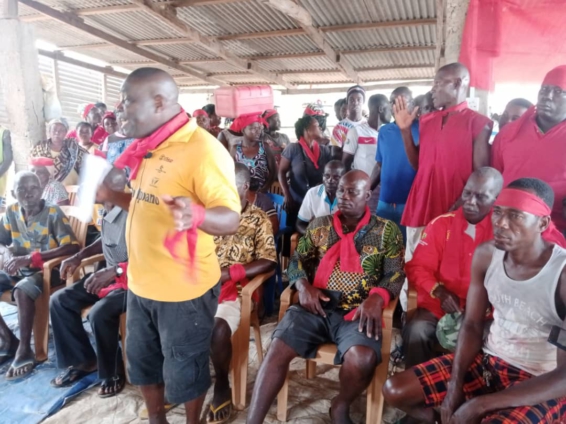Fishermen across the country’s four coastal regions have started a one-week protest against the activities of Saiko, the illegal transhipment of fish at sea.
This follows the airing of a JoyNews hotline documentary 'Saiko: When the last fish is caught' that investigated the activities of industrial trawlers on high seas.
Among other revelations, the industrial trawlers were caught using under-sized nets to catch small fishes (a preserve of local fishermen) only to throw the dead or undesirable fishes back into the sea.
Speaking to JoyNews' Richard Kwadwo Nyarko, a fisherman, said their suspicions had been confirmed by the revelations in the documentary.
They said although they are in their bumper season, they are unable to find any catch at sea, a situation that's killing the fishing industry.
The men, who have begun their strike, have asked government to ban the activities of Saiko in order to save the fishing industry.
At a press conference attended by JoyNews', red flags were seen hanging where flags of countries or football teams were once hoisted.
The fishermen, fishmongers and their children were all seen draped in red attires in protest against what they consider a serious threat to their livelihoods.
The move, the fishermen told JoyNews is to demonstrate to government the seriousness of the fight against Saiko, stressing the need for the Fisheries Ministry and the Fisheries Commission to go beyond mere rhetorics and ban the activities of the foreign vessels for good.
A spokesperson for the aggrieved fishermen, Nana Kweigya told JoyNews the deafening silence on the fight against Saiko by the government is worrying.
“In the 2020 budget, paragraph 718, government made a specific statement of stopping Saiko, but we have not witnessed that. So we are calling on the highest office of the land; the President and the government to live by their words of stopping Saiko,” he averred.
Nana Kweigya added that government’s intervention at this crucial moment is critical to saving the over three million people that directly depend on the sea for their subsistence.
“Saiko has been found to be a severely destructive form of illegal fishing, which in addition to driving the decline in marine fish stock, destroys the marine environment, and erode the potential to rebuild marine resources,” he said.
Across the four regions, the 7-day protest has been activated to pressure government to end the menace of Saiko.
The fishermen added that they will embark on a series of street protests should government do nothing about their situation.
Latest Stories
-
Postecoglou sacked by Spurs after Europa League win
6 minutes -
Employee fraud is everywhere, be intentional about stopping it – Expert counsels
1 hour -
We have a very good chance of making it to the World Cup – Jordan Ayew
1 hour -
Innovation Hubs as Engines of Sustainability: Charting Ghana’s path with lessons from the Hamburg Sustainability Conference 2025
1 hour -
UHAS makes history with publication of landmark study in Nature Human Behaviour
2 hours -
Asante Gold Corporation commended for community development projects in W/N region
2 hours -
World Environment Day: Stakeholders urge collaborative effort for sustainable ecosystem restoration
2 hours -
Photos: Thousands of Muslims observe Eid al-Adha 2025 at Independence Square
2 hours -
Russia launches ‘massive’ strikes days after Ukrainian drone attack
2 hours -
Ghana, Morocco agree to Visa-free travel for Ghanaians, says Foreign Affairs Minister
2 hours -
Samson Anyenini and OneGhana Movement renew calls for compensation for June 3 victims
3 hours -
California-based VIMA delivers lifesaving borehole to forgotten Ghanaian village
3 hours -
Health Minister calls for independent mediation to end nurses’ strike
3 hours -
Office of the Special Prosecutor remains Ghana’s most promising anti-corruption tool
4 hours -
Mahama promises significant drop in Hajj fares next year if…
4 hours

